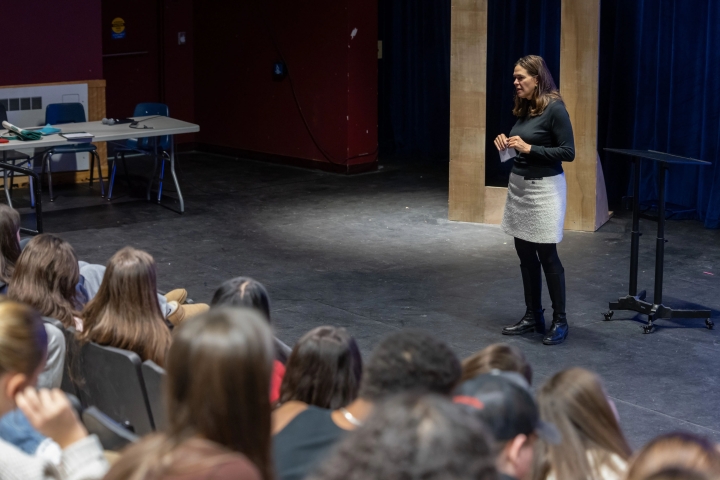Dartmouth is taking its efforts to help young people talk across their differences to Hanover High School this month, aided in part by a sophomore there who works on campus as an intern.
Motivational interview trainings—offered as part of the Dialogue Project—and the Q&A with President Sian Leah Beilock reflect two of the Dartmouth president’s top priorities: promoting dialogue and supporting mental health.
On Dec. 6, President Beilock met with students from Hanover High psychology classes to discuss her research as a cognitive scientist on performance anxiety and how to alleviate it.
Having watched her popular TED talk on performing under pressure, the 80 students who gathered in the Hanover High auditorium came prepared with questions that included what type of brain scans her lab uses; which coaching techniques best prepare athletes for competition; and how to differentiate between healthy and unhealthy levels of stress.
Feeling unwell, being anxious overall, or sleeping poorly can indicate that someone is experiencing an unhealthy amount of stress, Beilock said. “If a certain amount of stress gets you to perform at a high level and a little more makes it that you perform poorly, that’s another sign.”
Everyone feels stressed by different things, she said, “and what that right amount of stress is can change for us over time.”
Beilock shared that she herself has become more comfortable addressing large groups through experience and regular practice.
“I can come and talk in front of a lot of people,” she said. “My tolerance for that has changed.”
The Hanover High students are also taking part in motivational interviewing training led by Caitlin Barthelmes, director of Dartmouth’s Student Wellness Center, before the holiday break. The evidence-based approach aims to create collaborative interactions, building interpersonal skills that increase connection, support, and empowerment.
“We are so excited to explore sharing some of the tools from the Dialogue Project with our high school community,” says Heather Drinan, director of state government relations and community engagement at Dartmouth.

Drinan works closely with Hanover High sophomore Anna Williams, the government and community relations intern who played a key role in organizing this month’s events.
“Working with Anna, we honed in on the concept of workshopping supportive listening with peers,” Drinan says. “President Beilock’s conversation with the students around not just getting through, but excelling under pressure, was the perfect complement.”
Last summer, Williams completed a two-day training in motivational interviewing led by Barthelmes, which piqued her interest in providing fellow high school students with tools for managing difficult conversations, such as talking with a friend who’s struggling or fielding questions about their post-high school plans.
“High school can be very competitive. So, if you’re not going to the best school and your friend is, it’s kind of hard to have that conversation,” said Williams, who introduced Beilock at the Hanover High Q&A.
Williams says she hopes the participants “will take away some skills that they will think about or use in their daily life.”
Matt Prince, who teaches a section of psychology at the high school, says he and his colleagues organize large group sessions to connect students with real-world applications of concepts they cover in class, and to introduce them to the latest research in the field.
Prince said that over the years, Dartmouth, and Dartmouth Health, have been invaluable partners in providing speakers for such sessions.
“Tapping into the expertise within the Dartmouth community has significantly enhanced our students’ educational experience,” he says. “Students report that this is one of their favorite features of the class, and it helps teachers stay current with developments in psychology.”


